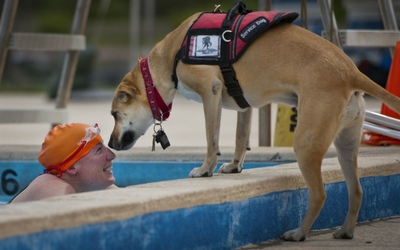
You’ve probably seen them around town, in the grocery store or the park; the cute puppies with the colored vests identifying them as service dogs-in-training. Or, maybe you’ve noticed people in your community with service dogs, guiding them across a busy intersection or through crowded public places.
International Assistance Dog Week was created to recognize all the devoted, hardworking assistance dogs that help individuals with disabilities mitigate their limitations and navigate the world around them. Assistance dogs change the lives of the humans they assist with mental and physical disabilities by serving as companions, helpers, supporters, and friends, enabling them to be more independent and keeping them safe. International Assistance Dog Week was created by Marcie Davis, a paraplegic, CEO, author and radio host, to honor assistance dogs around the world.
International Assistance Dog Week aims to recognize and honor all the selfless, caring working dogs; to raise awareness and educate the public about how service dogs aid people in their communities, to honor the people who raise and train assistance dogs, and to recognize the heroic deeds that service dogs perform.
Training guide dogs for the blind has been around for over seventy years, beginning in World War I in Germany, where the first ‘seeing eye’ dogs helped guide veterans blinded in combat. Since then, dogs have been increasingly used as assistance dogs beyond guide dogs for the visually impaired, and now can act as aids for people with a wide range of mental and physical disabilities.
Assistance dogs can range from guide dogs for blind or visually-impaired individuals, to hearing dogs for the hearing-impaired individuals, to service dogs that provide all types of assistance for their owners outside of vision or hearing needs, to mitigate many different types of disabilities. Some examples are seizure assistance (to detect, alert or respond to a seizure), balance or mobility issues, medical issues like diabetic alert, and other physical disabilities. Some service dogs work with veterans who have PTSD and other conditions after active duty, some work with people who live with conditions like autism, and other mental disabilities, where having a service dog brings them comfort and companionship, which is just as necessary as the helping hand they also provide.
These specially trained dogs help their owners with a wide variety of tasks, depending on their needs. Some guide visually-impaired individuals through traffic, avoiding obstacles and negotiating terrain, ensuring their safety; others alert hearing-impaired individuals to sounds such as door knock, baby crying, phone ringing or alarm sounding, having been trained to make physical contact with their owner and lead them to the source of the sound. Service dogs are trained to help in many ways, such as retrieving objects, opening and closing doors, turning lights on or off, alerting others when help is needed, providing balance and walking assistance, and many other tasks that may be required based on the individual’s needs.
Dogs that are well-suited to this type of work usually have a quiet and calm disposition, a high level of intelligence and initiative, good concentration and a strong drive to work. Many breeds can make wonderful service dogs, and having a pedigree is not a requirement. Common breeds used in service assistance are Golden Retrievers, Labrador Retrievers, German Shepherds, and Standard Poodles, as their intelligence, size, and temperaments make them well-suited to service work. However, many large and mixed breeds can be successfully trained to be assistance dogs, with characteristics such as temperament, size, and energy level being more important qualifiers for determining suitability for assistance work. Assistance dogs receive anywhere from six months to a year of training and socialization to learn to perform the various tasks, obedience, and public access manners needed to be a successful assistance dog.
Assistance dogs devote their lives to helping their owners, and perform important and heroic acts daily, from ensuring safety navigating busy street crossings to alerting owners to fire alarms. Other service dogs act as a reassurance and confidant for people with mental disabilities, enabling them to better cope with daily happenings and the world around them. No matter what duties assistance dogs perform, it is important to recognize the important role they play in society, and extend to them the respect and admiration they deserve for their selfless care and service.
To learn more about assistance dogs, and international Assistance Dog Week, you can visit www.assistancedogweek.org, www.assistancedogsinternational.org, or look for organizations in your local community.